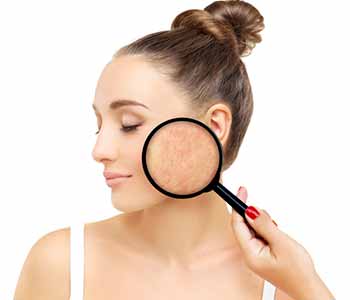Rosacea is a common skin condition, characterized by facial redness. Although it is not curable, it can be kept under control with a combination of lifestyle changes and professional skin treatment from Khrom Dermatology in Brooklyn, NY.
Rosacea vs acne
This condition is sometimes inaccurately called adult acne. In reality, rosacea and acne are entirely different conditions, although some people have both. If you aren’t sure which condition you have, it is important to see a dermatologist for evaluation and accurate diagnosis rather than attempting self-treatment. Using acne medication when you don’t have it will only damage skin and cause further problems.
Causes and risk factors
Rosacea is a complex skin disease, which is still not fully understood. Although the precise cause is not well known, medical researchers have identified a number of risk factors. We know that heredity plays a role, and that internal or environmental factors can trigger a flare. Evidence suggests links between rosacea and immune system malfunctions, gut bacteria, skin mites, and a protein called cathelicidin, but none of these have been proven to cause it.
Statistics show that rosacea is most common in people who:
- Are of Scandinavian or Celtic heritage
- Have a family history of rosacea or acne
- Are between the age of 30 and 50
- Frequently experience acne
- Have fair skin
Symptoms of rosacea
There are several types of rosacea, with differing symptoms
- Flushing, skin redness, and visible vessels are signs of Erythematotelangiectatic rosacea
- Swelling, redness, and acne-like breakouts are indicative of Papulopustular rosacea
- Bumpy texture and thickening skin are caused by Phymatous rosacea
- Symptoms in the eye area, including redness, irritation, and swelling of eyelids are associated with Phymatous rosacea
- With all types of rosacea, redness is common, especially in the midface area, and it may become permanent over time
Rosacea treatment
Your dermatologist will work with you to develop a treatment plan, based on your specific needs. Various procedures may be used to combat different rosacea symptoms. A vascular laser can reduce redness, while other light therapies or chemical peeling may be used to improve skin texture. An important part of every treatment plan is guidance to help you learn to identify and avoid triggers.
Call us at 718-751-0674 to schedule a consultation and learn about your best treatment options.



